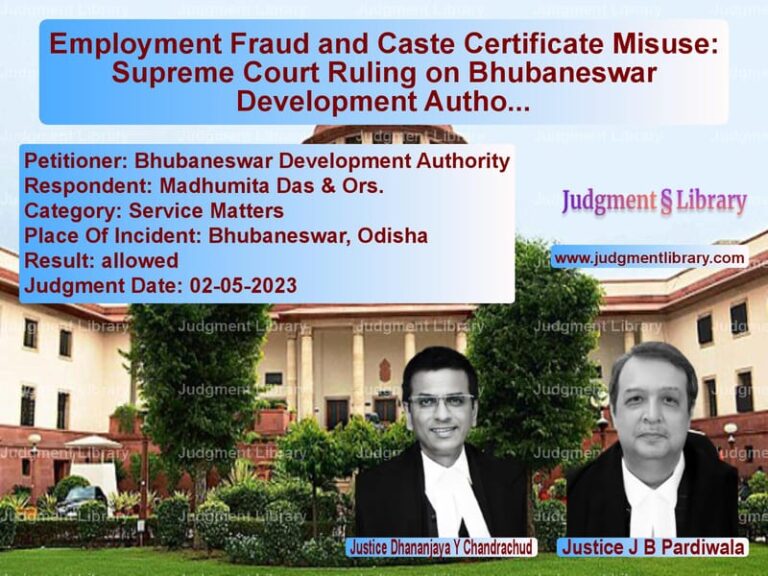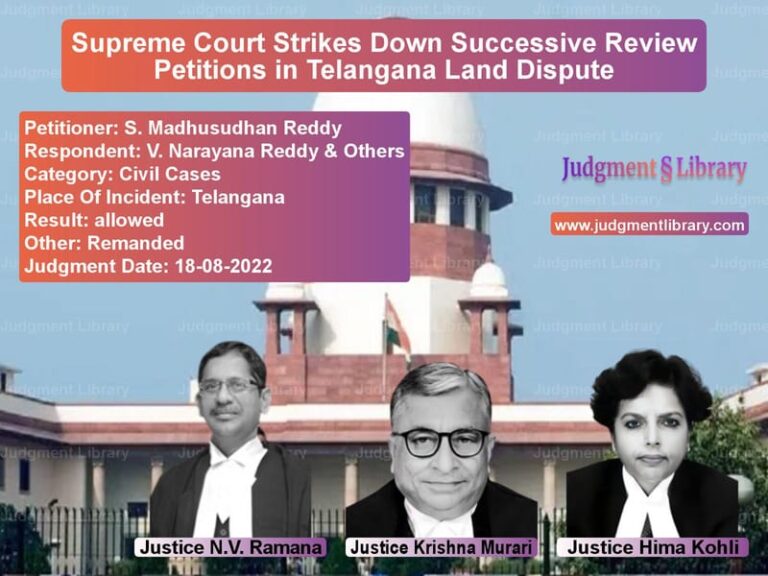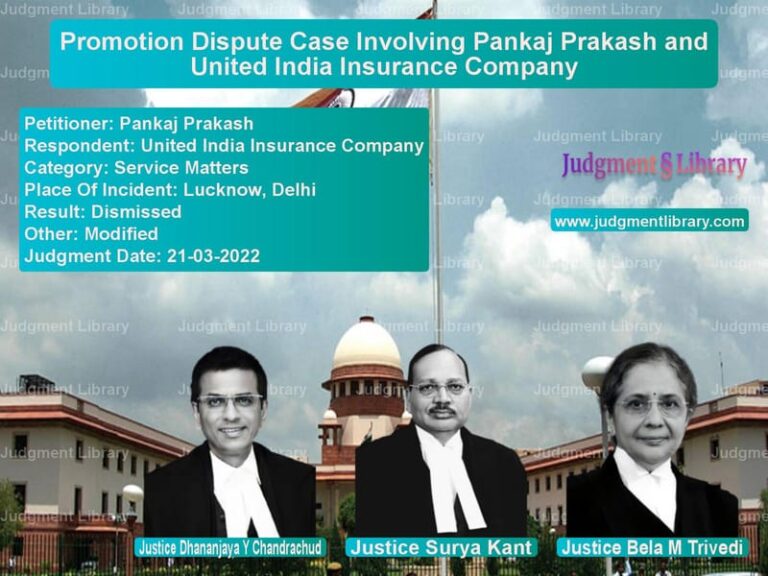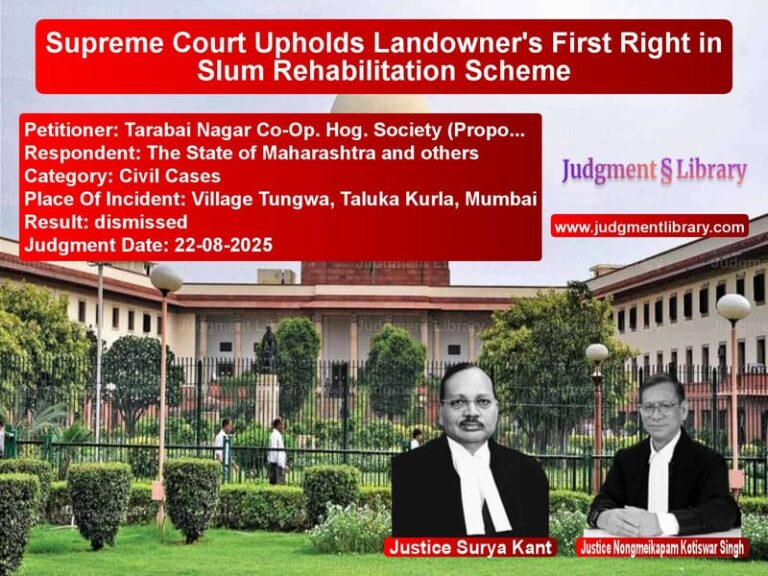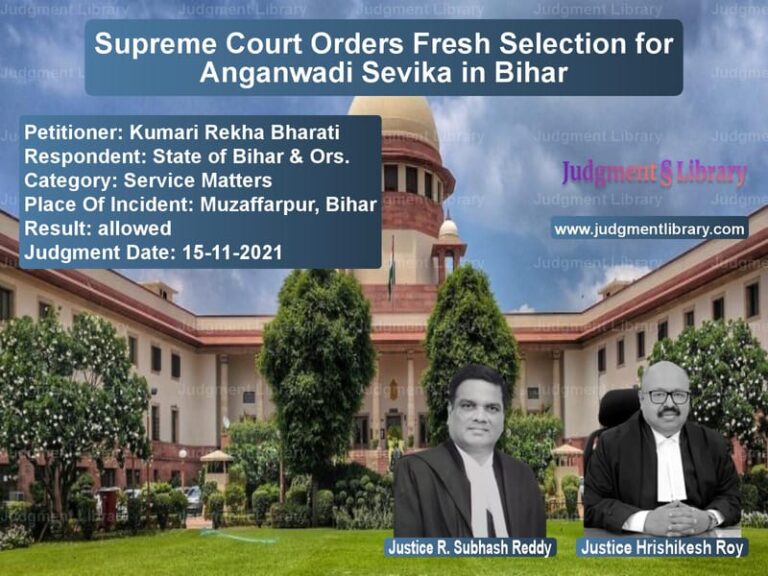SC/ST Reservation in Promotions: Supreme Court Allows Representation for Notional Promotion
The Supreme Court of India recently ruled on a case involving a dispute over the appointment of an Agricultural Development Officer in Punjab. The case, brought forward by Madho Singh against the State of Punjab, revolved around the issue of whether a Scheduled Caste (SC) candidate should have been given preference over a general category candidate for a reserved post. The judgment clarifies the rights of SC candidates in government appointments and the process for seeking redressal when reservations are not properly implemented.
Background of the Case
Madho Singh, the appellant, was an SC candidate aspiring for appointment as an Agricultural Development Officer in the State of Punjab. He argued that a post reserved for the SC category was wrongfully allocated to a general category candidate, Baghel Singh, who was senior to him in service.
The appellant claimed that despite being junior, he should have been appointed since the post in question was specifically reserved for an SC candidate. However, the Punjab government appointed a general category candidate to the position. Dissatisfied with the decision, Madho Singh approached the High Court, but his plea was not entertained. He then took his appeal to the Supreme Court.
Arguments of the Petitioner (Madho Singh)
Madho Singh put forth the following key arguments:
- The post of Agricultural Development Officer was reserved for the SC category, and as an SC candidate, he was eligible for appointment.
- Even though Baghel Singh was senior to him in service, he belonged to the general category and should not have been appointed to an SC-reserved position.
- The appointment of a general category candidate against a reserved post violated the reservation policy and the principles of social justice.
- He was entitled to appointment or at least notional promotion to rectify the improper appointment.
Arguments of the Respondent (State of Punjab)
The State of Punjab countered these claims with the following arguments:
- Baghel Singh was senior to Madho Singh and was, therefore, preferred for the appointment.
- There was no evidence that the appointment was illegal or that Madho Singh had an absolute right to be appointed.
- The claim had not been raised properly before the High Court, and thus it was not adjudicated in the earlier proceedings.
- Madho Singh had already retired, and any intervention at this stage would be unnecessary.
Supreme Court’s Analysis and Judgment
The Supreme Court analyzed the issue of reservation in promotions and appointments. The Court observed:
“There is no dispute that the General category candidate, namely, Baghel Singh, is senior to the appellant, but according to the appellant, since it was a post reserved for the Scheduled Caste category, though the appellant was junior, he being the Scheduled Caste, as against the General category, the appellant should have been appointed.”
The Court noted that this specific argument had not been raised before the High Court and that the affected parties were not present before it. However, the Court acknowledged the appellant’s grievance and provided him with an alternative remedy.
Key Directives of the Supreme Court
- The appellant was granted liberty to submit a formal representation to the State of Punjab regarding his claim for notional promotion.
- The representation must be made within one month from the date of the judgment.
- The State of Punjab was directed to consider the representation after providing an opportunity for a hearing to both the appellant and any other affected parties.
- The State was required to pass a final order within four months of receiving the representation.
- The matter was disposed of without imposing any costs on either party.
Final Verdict
The Supreme Court ruled that while it would not interfere with the appointment directly, it allowed Madho Singh the opportunity to seek notional promotion by making a formal representation to the State government.
Implications of the Judgment
This ruling has significant implications for SC/ST reservation policies and government employment:
- Reinforces the principle that reserved category candidates have a right to seek redressal if a reserved post is wrongly allocated to a general category candidate.
- Provides a structured mechanism for candidates to challenge improper appointments through administrative representation.
- Emphasizes that reservation policies must be implemented properly to ensure social justice.
- Clarifies that the judiciary can provide alternative remedies, such as allowing candidates to file representations instead of overturning appointments outright.
This judgment underscores the importance of upholding reservation policies while also ensuring that legal remedies are pursued through proper administrative channels.
Don’t miss out on the full details! Download the complete judgment in PDF format below and gain valuable insights instantly!
Download Judgment: Madho Singh vs State of Punjab & An Supreme Court of India Judgment Dated 11-07-2017.pdf
Direct Downlaod Judgment: Direct downlaod this Judgment
See all petitions in Employment Disputes
See all petitions in Recruitment Policies
See all petitions in Public Sector Employees
See all petitions in Judgment by Kurian Joseph
See all petitions in Judgment by R. Banumathi
See all petitions in Remanded
See all petitions in Remanded
See all petitions in supreme court of India judgments July 2017
See all petitions in 2017 judgments
See all posts in Service Matters Category
See all allowed petitions in Service Matters Category
See all Dismissed petitions in Service Matters Category
See all partially allowed petitions in Service Matters Category



